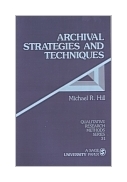|
||
• wydawnictwa polskie
• Zamów informacje o nowościach z wybranego tematu • kontakt
• Cookies na stronie |
ARCHIVAL STRATEGIES AND TECHNIQUESM.HILLwydawnictwo: SAGE , rok wydania 1993, wydanie Icena netto: "I think that anyone who has an interest in traditional archival research will
find this a thoughtful and valuable guide to the many different elements of the research
process." "His research advice is systematic and thorough and could easily serve for other
researchers than sociobiographers. In eighty-eight pages, Hill has managed to pack not
only this sound research advice but a critique of archival practices and a six-page
bibliography. The book is certainly worth a read. . . . and could give archivists an
opportunity to broaden their sociological horizons." "Michael Hill's monograph, Archival Strategies and Techniques, depicts a world
that some might think would be as dusty as old manuscripts themselves, but in the process
of describing the excitements, joys, frustrations, and ethical conundrums, he has
demonstrated that the archival scholar can share thrills and fears with Indiana Jones.
Hill's book is filled with lively anecdote, compelling analysis and a full measure of wit.
This monograph will be an invaluable companion for anyone planning to spend time in
libraries, dusty or otherwise." "Much more than a how-to book, Michael Hill interprets archives and their use from
a Goffmanian sociological perspective. As an extra benefit, he guides readers through the
archival process by drawing on a sociological/historical project - the recovery of unknown
or presently discounted social scientists. Any teacher who assigns a term paper to
students will want to recommend this book!" "Michael Hill has produced a lively and, for some of us, comforting guide to
archival research in sociology. . . . The book is comforting because among the gems
contained within this short monograph is a discussion of the need to recover 'unknown or
presently discounted social scientists' as an important epistemological task." Historical and biographical research is increasingly used by social scientists as an important form of qualitative research. This kind of research usually requires the extensive use of formal archives housed in university and government buildings, museums, and other institutions. This concise, but practical book provides the "rules of the game" for the novice on conducting and preparing to work in archives, the protocol of using archives, and ways of organizing and referencing the useful data from the archive. This intriguing volume will interest scholars and students from a wide array of disciplines using this type of research for social analysis. 88 pages Księgarnia nie działa. Nie odpowiadamy na pytania i nie realizujemy zamówien. Do odwolania !. |


